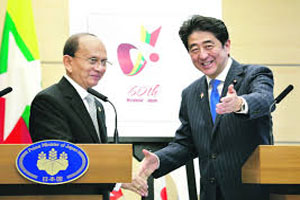
Japanese investors show growing interest in Myanmar but with caution
YarnsandFibers News Bureau 2015-07-06 14:00:00 – TokyoBusinesses from Japan are showing interest in Myanmar’s untapped potential and a distinctive culture such as hand woven textiles but are investing cautiously as Myanmar has a range of problems that are barriers to investors. The biggest problem is shortage of electricity. They often suffer from power outages. Another major problem is the vulnerability of the country’s infrastructure such as roads, railways, communications, water supply and sewage systems.
Kyoko Okutani, the head of Women's World Banking Japan, who has helped more than 1,000 women launch their own enterprises in Japan enchanted by Myanmar made her fourth trip to Myanmar in early June to explore more business opportunities in the South-East Asian country, this time inviting designers from Japan.
Okutani and the designers visited Myitkyina in northern Myanmar, and Nyaungshwe and Mandalay in the central part of the country. The highlight of their trip was to travel to Lake Inle to meet artisans and see lotus fabric, which is considered to be more precious than silk, she said.
Okutani said her group is considering the creation of products with local fabrics.
Like Okutani’s group, more Japanese businesses have been seeking a foothold in Myanmar since the country’s liberalising reforms under President Thein Sein.
The Japanese government has wasted no time boosting its economic clout. On Saturday, Prime Minister Shinzo Abe pledged nearly 100 billion yen (813 million dollars) in low-interest loans to Myanmar to help develop infrastructure in a meeting with the president, which was held on the sidelines of the Mekong-Japan summit.
Japanese investment, however, accounted for less than 1 percent of a total amount of foreign investment in Myanmar from 1989 to October 2014, Jetro said, citing the country’s government data. China was responsible for 29 percent, Thailand for 20 percent and Singapore for 14 percent.
So far, the number of existing Japanese manufacturers is only 10, most of which operate garment factories. Daieikiseifuku Corp of Nagoya, central Japan, opened a clothing factory in Myanmar as early as in 2002 to diversify risk and cut costs, said the company whose other overseas plant is in China. In 2007, the company started to produce 21,000 business suits a month in Myanmar with 1,150 local employees.
The Thilawa special industrial zone, 23 kilometres south-east of Yangon, opened in the summer, 21 of the 40 companies that have taken units there are Japanese, the trade group said.
Japanese firms can find several advantages in Myanmar such as rich natural resources and the cheapest labour in the region. Myanmar also shares borders with China and India, two of the world’s largest markets.
In Japan, more seminars and conferences on business opportunities in Myanmar have been held not only in Tokyo but also outlying regions as a variety of companies are considering business opportunities there.
More Japanese companies “show growing interest†in Myanmar, said Keiji Kubo, an official at the government’s Shikoku bureau of Economy, Trade and Industry in Takamatsu on the south-western island of Shikoku.
Market Intelligence
Ask for free sample Report

experience
Customer Base
dedicated team
Countries Served Worldwide









